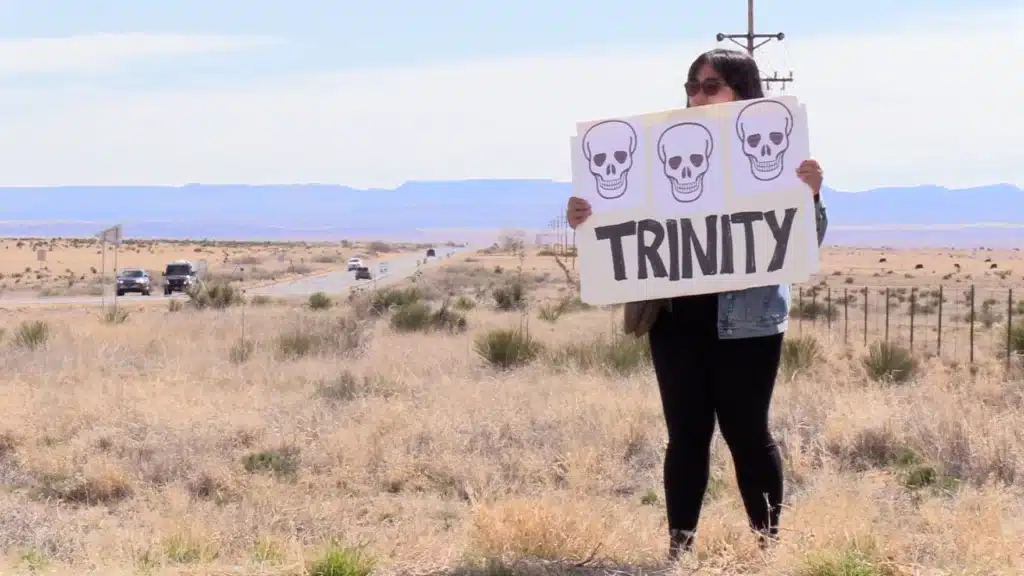Why cost should not be an obstacle to compensating nuclear survivors
By Alicia Sanders-Zakre, Susi Snyder | July 1, 2024
 A protester near the Trinity nuclear test site. Legislation to extend and expand the Radiation Exposure Compensation Act (RECA) was recently reintroduced in the US Senate after stalling in the House late im 2024. (Credit: Jonny Coker / KRWG)
A protester near the Trinity nuclear test site. Legislation to extend and expand the Radiation Exposure Compensation Act (RECA) was recently reintroduced in the US Senate after stalling in the House late im 2024. (Credit: Jonny Coker / KRWG)
Passing an extended and expanded Radiation Exposure Compensation Act (RECA) would be an enormous victory for those affected by US nuclear weapons testing and development who will receive compensation from the legislation. A proposed revised bill would include many communities formerly left out from the compensation program, including additional residents of Arizona, Nevada and Utah, for the first time, residents of Colorado, Idaho, Guam, Montana and New Mexico, uranium miners after 1971, veterans of nuclear waste clean-up in the Marshall Islands, and St. Louis area residents exposed to nuclear waste. The bill, originally estimated by the Congressional Budget Office to cost $147 billion over 10 years, was cut down to cost $50 billion over 10 years, due to concerns by members of Congress about the expense. A RECA bill has gained overwhelming support in the Senate, but it has yet to be passed by the House, in part due to ongoing concerns about the price tag.
Our research shows that more resources exist and should be directed to this important effort, in the United States and internationally, where many nuclear survivors still wait for justice. In our report, we found that nuclear-armed countries spent $91.4 billion on nuclear weapons in 2023 alone. That’s nearly $3,000 every second. The United States spent more than half of that total – $51.5 billion or $1,633 per second. In the five years that we have done this research, from 2019 to 2023, governments have spent a total of $387 billion on nuclear arsenals. The United States alone spent more than $212 billion of that total.
The amount that the United States and other nuclear-armed governments have put towards addressing the harmful legacy of nuclear weapons for their citizens pales by comparison. Since RECA was passed in 1990, the United States has put $2.67 billion into one-time settlements to compensate those whom the United States considered eligible. To address the nuclear legacy of its testing in the Marshall Islands, the United States gave $150 million to establish a Nuclear Claims Tribunal in 1987, but has not provided further funds explicitly for this purpose since.
Internationally, compensation for survivors also comes up short. Russian nuclear test veterans receive one-time compensation for harm to health of 22,102 roubles ($245 as of February 1, 2024) as well as small monthly stipends for food. In 2023, Russia spent 710.5 billion roubles ($8.3 billion) on its nuclear arsenal. In France, CIVEN, le Comité d’Indemnisation des Victimes des Essais Nucléaires, provided 14.9 million euros ($15.9 million) to victims of its nuclear testing in Algeria and French Polynesia in 2022. Last year, France spent 5.6 billion euros ($6.1 billion) on its nuclear weapons. The United Kingdom provided a “full and final” settlement payment of £20 million to Australia in 1993 to remediate former nuclear tests sites there, in comparison to the £6.5 billion ($8.1 billion) it spent on its nuclear arsenal in 2023.
It is no coincidence that, around the world, formerly colonized and Indigenous populations were the first to be bombed and the last to receive recognition and compensation. Existing programs rarely address the multifold harms of nuclear testing beyond physical harm from radiation, such as the psychological and economic toll of displacement, deprivation of traditional ways of life or the fear of children also suffering the scars of nuclear weapons.
But international efforts to address nuclear harms, grounded in human rights principles, have increased in recent years. In July 2017, 122 governments adopted the Treaty on the Prohibition of Nuclear Weapons. The treaty includes Articles 6 and 7, creating for the first time an international collective effort to address the impacts of nuclear weapons use and testing on people and the environment. States affected by nuclear weapons use and testing that have joined the treaty—such as Kazakhstan, Kiribati, Fiji, and New Zealand—take the lead in identifying needs for affected people and for environmental remediation in their countries and designing national plans of action and structures to address those needs. All governments that have joined this treaty pledge to help if they are able. States are currently discussing establishing an international trust fund to support this work.
Providing adequate assistance to those suffering from nuclear harm and beginning to remediate contaminated environments will cost money. It will also take time. But the cost is not an excuse to forgo necessary nuclear justice programs. Our research clearly shows that ever-growing budgets to build and rebuild nuclear arsenals are readily approved by every nuclear-armed government, while funds to help those suffering are a pittance in comparison.
The exorbitant funding poured into producing and maintaining weapons of mass destruction—as those who have borne the brunt of their impacts are dismissed—constitutes a gross dereliction of duty by the nuclear-armed countries. Governments must work together at the national and international level to address the multifaceted harms that nuclear weapons production and testing have inflicted on survivors and the environment. Extending and expanding RECA would be a good place to start. House leaders should stop stalling and start acting.
Together, we make the world safer.
The Bulletin elevates expert voices above the noise. But as an independent nonprofit organization, our operations depend on the support of readers like you. Help us continue to deliver quality journalism that holds leaders accountable. Your support of our work at any level is important. In return, we promise our coverage will be understandable, influential, vigilant, solution-oriented, and fair-minded. Together we can make a difference.
Keywords: Marshall Islands, RECA, nuclear weapons spending
Topics: Analysis, Nuclear Waste, Nuclear Weapons
















